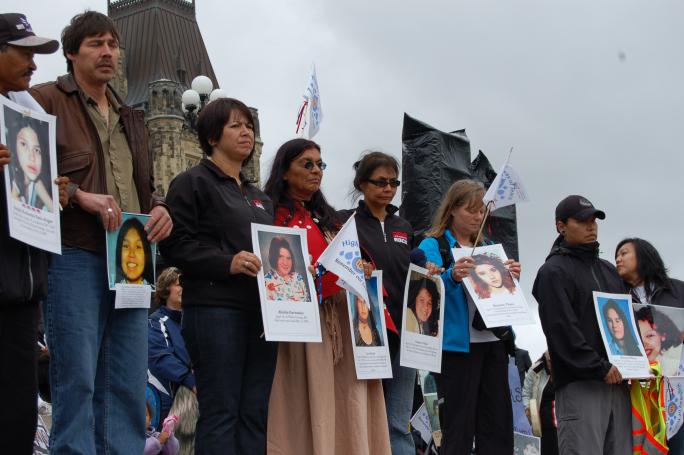Canada News
Colonial genocide is a composite act: A human rights analysis

The central question the Inquiry asked was: if you consider all the policies of our governments regarding Indigenous peoples since the time of first European settlement, can you argue that Canada’s treatment of Indigenous women and girls (and of Indigenous men and boys) is genocide? (File Photo: Amnesty International Canada/Website)
Canada is currently embroiled in a debate about whether the National Inquiry into Missing and Murdered Indigenous Women and Girls should have used the word “genocide” to describe our federal, provincial and municipal governments’ past and current treatment of Indigenous peoples. Perhaps this word is too strong and inaccurate.
Many horrible events are not genocide. Warfare is not genocide. Apartheid in South Africa was not genocide. The trans-Atlantic slave trade was not genocide. Torture is not genocide.
In international law, genocide refers to “acts committed with intent to destroy, in whole or in part, a national, ethnical, racial or religious group, as such.” This is the definition in the 1948 United Nations Convention on the Prevention and Punishment of the Crime of Genocide.
One crucial word in this definition is intent. Did or do Canadian authorities, in the past or the present, intend to destroy the “racial” or ethnic group of Indigenous Canadians, in whole or in part?
Canada knew it was vulnerable to charges of genocide
The central question the Inquiry asked was: if you consider all the policies of our governments regarding Indigenous peoples since the time of first European settlement, can you argue that Canada’s treatment of Indigenous women and girls (and of Indigenous men and boys) is genocide?
The Supplementary Report, “A Legal Analysis of Genocide,” explains the Inquiry’s decision to describe Canada’s treatment of its Indigenous peoples as genocide. It does not rely solely on the text of the 1948 Convention against Genocide. Instead it carefully reviews legal and social scientific analyses of genocide over the last three decades. It primarily refers to decisions by the international tribunals established by the United Nations to try individuals accused of genocide, war crimes and crimes against humanity in the former Yugoslavia and Rwanda.
The Report explains that before the 1948 law was adopted, there was a discussion at the UN on whether to prohibit cultural genocide. Canada, along with other countries that had Indigenous populations, actively pushed not to define cultural genocide as a crime — and it succeeded. So right from the start, 71 years ago, Canada knew it was vulnerable to charges of genocide.
At that time, no Indigenous peoples were represented at the UN, so there was no one to present an Indigenous perspective on genocide. Nor was there a gendered perspective on the crime. That came much later, with decisions on the gendered aspects of genocide at the Yugoslavia and Rwanda tribunals.
The report also notes that as opposed to international law, Canadian law pertaining to genocide (the 2000 Crimes against Humanity and War Crimes Act) refers to acts of omission as well as commission. So if Canada neglects its Indigenous peoples as they are subjected to genocidal acts, that can be considered part of genocide.
Genocide is not a single event
The report explains that genocide is not always a single event, such as the prototypical Nazi genocide against the Jews and Roma of Europe, or the genocide against Tutsi in Rwanda in 1994. Colonial genocide is a composite act. It is composed of the cumulative effect of many discrete actions, such as dispossession from land, neglect of and starvation of Indigenous populations, and kidnapping of children.
In adopting this view, the MMIWG report argues that analysis of the treatment of Indigenous people must consider the long-term effects of structural violence. It’s not enough to “add up” some discrete events and then try to figure out if the total is genocide.
The MMIWG report also maintains that genocide does not refer only to the deliberate murder of some or all members of a particular social group. It also refers to the destruction of a group as a social unit. If members of the group are so dispersed from each other, or if their culture, languages or traditions are so undermined that they can’t act together as a cohesive social unit, then that is genocide. This argument derives from the 1948 Convention, which refers to the destruction of groups as groups.
Finally, and extremely important, the MMIWG report analyses the requirement of intent. It argues that when dealing with states rather than individuals as possible perpetrators of genocide, state policy indicates intent. It is not necessary to go into the “minds” of individuals holding power to see if they intend to destroy Indigenous peoples as a social group.
All these arguments make a compelling case that Canada’s treatment of Indigenous peoples has been and still is genocide.
——
This article is republished from The Conversation under a Creative Commons license. Disclosure information is available on the original site.
Read the original article:
https://theconversation.com/colonial-genocide-is-a-composite-act-a-h





















